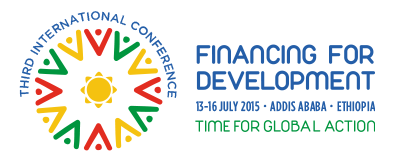The Third Drafting Session on the Outcome Document of the Third International Conference on Financing for Development (FfD 3) has come to a close, following continuous informal consultations at various levels since the plenary was suspended on 22 June 2015.
With Member States still unable to achieve consensus on the draft of the text to be adopted at FfD 3, which begins on 13 July 2015, in Addis Ababa, Ethiopia, the co-facilitators of the preparatory process convened a closing plenary, proposing that the latest version of the text be considered further at the Conference itself.
 7 July 2015: The Third Drafting Session on the Outcome Document of the Third International Conference on Financing for Development (FfD 3) has come to a close, following continuous informal consultations at various levels since the plenary was suspended on 22 June 2015. With Member States still unable to achieve consensus on the draft of the text to be adopted at FfD 3, which begins on 13 July 2015, in Addis Ababa, Ethiopia, the co-facilitators of the preparatory process convened a closing plenary, proposing that the latest version of the text be considered further at the Conference itself.
7 July 2015: The Third Drafting Session on the Outcome Document of the Third International Conference on Financing for Development (FfD 3) has come to a close, following continuous informal consultations at various levels since the plenary was suspended on 22 June 2015. With Member States still unable to achieve consensus on the draft of the text to be adopted at FfD 3, which begins on 13 July 2015, in Addis Ababa, Ethiopia, the co-facilitators of the preparatory process convened a closing plenary, proposing that the latest version of the text be considered further at the Conference itself.
The third drafting session was originally scheduled to conclude on 19 June, but negotiations continued in the plenary until 22 June, when the co-facilitators announced that although a new draft was almost finalized, taking on board various “red lines” to find a place of convergence, there were a couple of issues of “great sensitivity” on which consultations were taking place at the political level.
Opening the final plenary on 7 July 2015, at UN Headquarters in New York, US, Co-Facilitator George Talbot, Permanent Representative of Guyana, said the issues that remain open include common but differentiated responsibilities (CBDR), the relationship between FfD 3 and the post-2015 development agenda, and questions relating to tax.
Talbot said the Co-Facilitators had tried to facilitate delegates’ work to reach an agreement in the context of a very demanding year―a year when the international community is embarking on new horizons for partnership and development. While he expressed his disappointment that the document had not been agreed, he expressed the hope that delegates can reach the compromises necessary to assure success in Addis, and that the Conference will adopt an outcome “we will all be proud of.”
Co-Facilitator Geir Pedersen, Permanent Representative of Norway, looked forward to “continuing the good work” in Addis, and expressed the hope that “we can conclude quickly” once at the Conference.
South Africa, on behalf of the Group of 77 and China (G-77/China), thanked the Co-Facilitators and UN General Assembly President Sam Kutesa for “trying to steer us in the right direction.” He said the Group will engage in the outstanding issues in Addis, and it may be possible to be “cautiously optimistic” at this stage.
The EU said its member States are ready to accept the proposed text “with a few amendments” and to work on the remaining problematic issues in the spirit of compromise. He added that: the FfD 3 outcome should provide the conceptual and policy framework for all the means of implementation (MOI) included in the report of the Open Working Group (OWG) on the Sustainable Development Goals (SDGs); the text should be short and limited in scope; and EU Governments are unhappy with the “weak language” on carbon pricing and fossil fuels.
The US said Member States have missed an important opportunity to finalize the text in New York, and highlighted that the list of open issues might not be the same for everyone involved. He said the FfD 3 “proposed package” breaks important ground on how development should be financed, and stressed the need for a win-win situation for all, inviting delegates to shift their focus from what could not be obtained to what was obtained through the negotiations. “I am sure that we can achieve consensus, cross the finish line and ensure Addis becomes a milestone for development,” he added.
Japan expressed disappointed that agreement could not be reached. Emphasizing that “nothing is agreed until everything is agreed,” he said Japan does not consider any part of the text locked in.
Switzerland said an ambitious outcome is crucial, as FfD 3 is the first of three major conferences in 2015. He added that only if we have an ambitious outcome in Addis, can we have good outcomes at the Post-2015 Summit in September and at the Climate Change Conference in Paris in December.
Ethiopia said this process has come a long way and covered a lot of ground, and expressed confidence that the outcome will be a “resounding success.”
The latest draft of the outcome document was circulated ahead of the closing plenary. [Addis Ababa Action Agenda Draft Outcome Document, 7 July 2015] [IISD RS Coverage of Third Drafting Session]